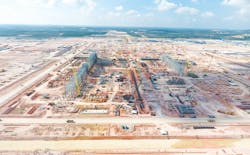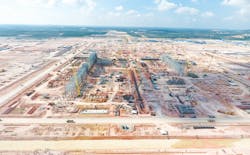Petronas lets contracts for Pengerang complex
Robert Brelsford
Downstream Technology Editor
State-run Petronas has let contracts for industrial gas and power supplies and equipment for its long-planned Pengerang integrated complex (PIC) and refinery and petrochemical integrated development (RAPID) project at Pengerang in southeastern Johor, Malaysia (OGJ Online, Aug. 11, 2014).
As part of long-term supply agreements with Petronas, Pengerang Gas Solutions Sdn. Bhd. (PGS)-a joint venture of Linde AG subsidiary Linde Malaysia Sdn. Bhd. and Petronas Gas Bhd. (PGB)-will invest €150 million to build a grassroots air gas plant that will produce gaseous oxygen and nitrogen to meet RAPID's industrial gas needs, Linde said.
The air gas plant, which will include two large air-separation units (ASU) and associated gas installations, will be built on site at the PIC complex and be equipped with proprietary air-separation technology from Linde, which also will provide engineering, procurement, construction, and commissioning services for the ASUs as part of a separate contract with PGS, the service provider said.
Linde disclosed no further details regarding the value or specific duration of the supply agreements.
Under development by PGB, the ASU plant will use cryogenic fractionation distillation at a very low temperature (-196° C.) to separate atmospheric air into its primary components (oxygen and nitrogen), Petronas said.
The plant will include two separate ASU trains that, combined, will have a capacity to generate 1,600 tonnes/day (tpd) of oxygen and 1,800 tpd of nitrogen to provide PIC with 46,233 cu m/hr (1,584 tpd) of O2 and 45,631 cu m/hr (1,370 tpd) of N2.
Commissioning of the ASU plant is scheduled to coincide with startup of operating units at RAPID's refining leg, which previously was targeted for July 2018.
Separately, Petronas has let a contract to General Electric International Inc. to provide a mix of equipment designed to enable uninterrupted power supplies to RAPID in the event of unexpected electrical outages at the site, GE said.
Through a strategic partnership with Petronas subsidiary Prime Sourcing International (PSI), GE will supply 17 emergency diesel generator (EDG) packages, five transportable switch rooms, as well as the electrical balance of the plant.
Each EDG package will include GE's 616 diesel engines coupled with generators and electrical equipment bounded in e-houses, according to the service provider. GE did not disclose a value of the contract.
PIC overview
Alongside RAPID, PIC will include six associated facilities, namely the Pengerang cogeneration plant (PCP), an LNG regasification terminal, the ASU plant, a raw-water supply project, a liquid bulk terminal, as well as central and shared utilities and installations.
With a planned capacity of 300,000 b/d, the RAPID refinery will produce naphtha and LPG feedstock for the petrochemical complex, as well as gasoline and diesel meeting Euro 5-quality specifications to help address Asia-Pacific's growing need for petroleum and petrochemical products.
The $27-28-billion complex will have a combined capacity to produce 7.7 million tonnes/year of various grades of products, including differentiated and specialty chemicals products.
As of late June, Petronas said it had reached the midpoint of the project schedule and remained on track to achieve overall startup of PIC during first-quarter 2019 (OGJ Online, June 27, 2016).
By mid-July, however, Petronas also had commissioned PIC's raw-water supply project, Projeck Air Mentah RAPID (PAMER), which became the first installation within PIC to reach startup, Petronas said.
Designed to provide a total of 260 million l./day of raw water from the Seluyut dam mostly to PIC operations, PAMER also will channel 30 million l./day of raw water to Johor State's Sungai Lebam reservoir to help supplement existing municipal water supplies for the public in and around Pengerang, the company said.
In late August, Petronas additionally confirmed completion of major construction-related works on two 200,000-cu m LNG storage tanks for PIC's LNG regasification terminal.
Equipped with a 3.5 million-tpy capacity for LNG regasification, handling, storage, unloading, and reloading to help supply primary gas needs to PCP, as well as other PIC installations, the LNG regasification terminal is due to be commissioned by fourth-quarter 2017, according to Petronas.

